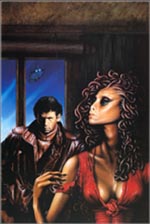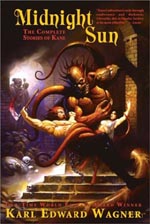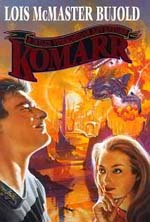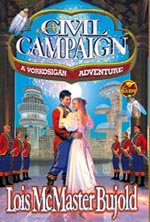 This was the third time I’ve attempted to read Startide Rising. A couple years ago I read Sundiver, the first of Brin’s Uplift books, and enjoyed it enough that I immediately ran out to buy the Earthclan omnibus (collecting Startide Rising and The Uplift War). I naturally started reading Startide Rising as soon as I got home, but after about twenty or thirty pages I simply lost interest and got involved in another book.
This was the third time I’ve attempted to read Startide Rising. A couple years ago I read Sundiver, the first of Brin’s Uplift books, and enjoyed it enough that I immediately ran out to buy the Earthclan omnibus (collecting Startide Rising and The Uplift War). I naturally started reading Startide Rising as soon as I got home, but after about twenty or thirty pages I simply lost interest and got involved in another book.
I picked it up again about six months later and didn’t even get that far before putting the book down again.
This time I managed to build up a good head of steam and finished the book. But I found the exact same flaws this time which had turned me off the book completely the last two times I’d attempted to read it: Crude characterization, sloppy prose, and a poorly constructed narrative.
The first and most immediate problem is that Brin literally starts his story in the wrong place. I have nothing against in media res openings, but imagine Rendezvous with Rama if Clarke had decided to start the narrative with the alien ship already half-explored. It’s not inconceivable that some other writer could have started the story in the same place and made it work, but it’s certain that Brin didn’t: Large swaths of the first hundred pages is spent conveying heavy-handed chunks of pace-killing, awkward exposition.
And when the exposition isn’t killing your interest in the book, Brin’s clumsy writing takes up the slack. Not only does he literally have characters giving “as you know, Bob” speeches, but he frequently feels a need to explain to the reader why the last paragraph was not, in fact, awkward and out of character (which, of course, only calls attention to the fact that it was, in fact, awkward and out of character).
The cast, meanwhile, is populated by trite clichés who – despite the momentous and deadly circumstances in which they find themselves – seem to be mostly content in playing out mediocre soap opera dramas. In fact, their mundanity is an impressive achievement considering that most of them are uplifted dolphins.
In some ways, it almost feels as if Brin is deliberately on a scavenger hunt for every bad habit of science fiction writing he can find, and Startide Rising is his way of checking off the finds. He even makes one of his characters briefly an aficionado of 20th century science fiction, and then he follows up by having her claim that if someone were reading about Brin’s Uplift universe back then they wouldn’t believe it (because its oh-so-dark)! I’m pretty sure I audibly groaned when I came across that stinker of a paragraph.
So why did I keep reading through this slop? Because where Startide Rising succeeds is in the sheer creative scope of its future: A galactic society billions of years old, formed entirely of species artificially uplifted to sentience and capable of tracing their ancestry back to near-mythic Progenitors. An anarchic society given constancy only by is adherence to the principles of uplift – that each client species shall give, in payment for its sentience, a hundred thousand years of indentured servitude to its patrons – and to the Library, a body of knowledge contributed to and shared by every sentient species.
Even here, unfortunately, Brin doesn’t quite get the job done. (For example, not only are his aliens limited to uni-cultures that make Star Trek species look positively diverse, but he has those uni-cultures persist for MILLIONS OF YEARS.) But, ultimately, it’s the speculation in Brin’s speculative fiction that captures the imagination and keeps you reading.
In fact, as a general principle, Brin consistently succeeds when it comes to the Big Ideas. It’s only in the details that he falls down flat. For example, all the little mini-soap operas Brin has playing out among his cast of characters ring false; but the greater drama – of a Terran crew desperately fleeing the wrath of the galaxy after stumbling across a secret better left forgotten – works on a compelling level. Similarly, Brin’s future is pedestrian in its part, but epic in its scope: Any given technology is relatively commonplace, but a galactic society so ancient and diverse that they have developed a hundred different ways to break the lightspeed barrier immediately captures the imagination.
It’s also true that, as the book goes on, Brin begins to find his feet and delivers a more reliable performance. But this has as much to do with the fact that, as Brin gets his tiresome exposition out the way, the main plot heats up and he has less and less time to dwell on his mediocre soap operas.
In the final analysis, Startide Rising is disappointing because it could have been so much more. But, by the same token, that failed promise of greatness still results in a good book. A flawed book, yes, but a book which still delivers a lot of entertainment on a lot of different levels.
GRADE: B
David Brin
Published: 1983
Publisher: Spectra
Cover Price: $7.50
ISBN: 0-553-27418-X
Buy Now!
















